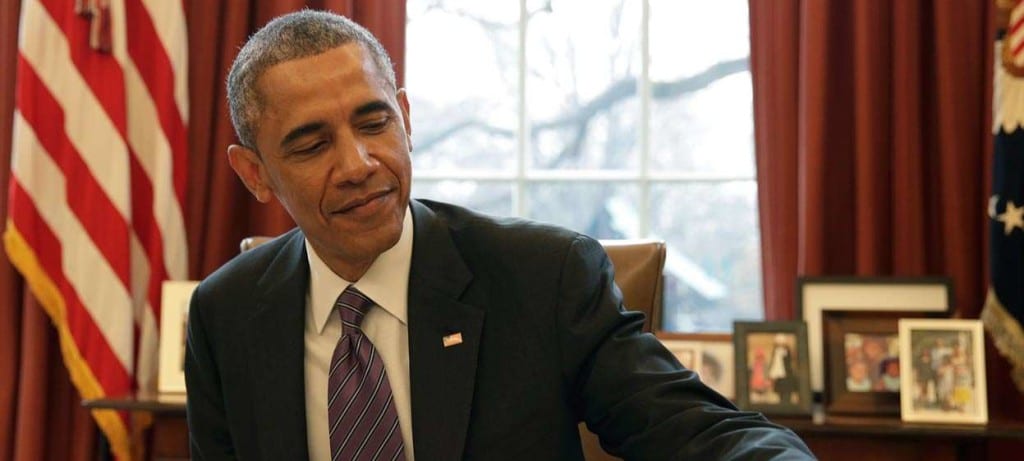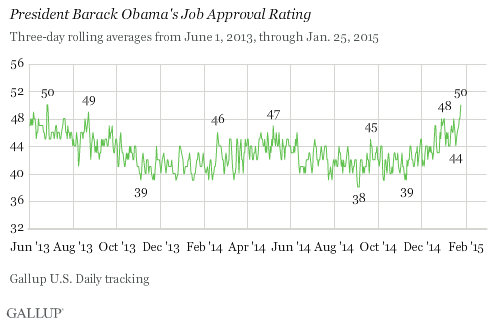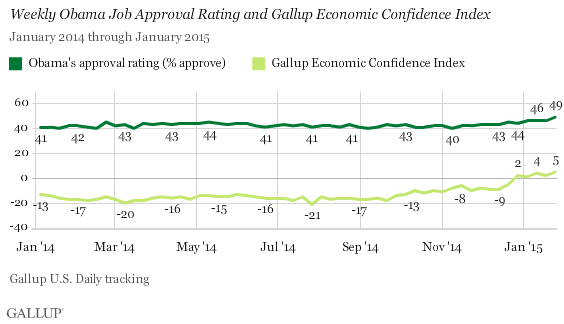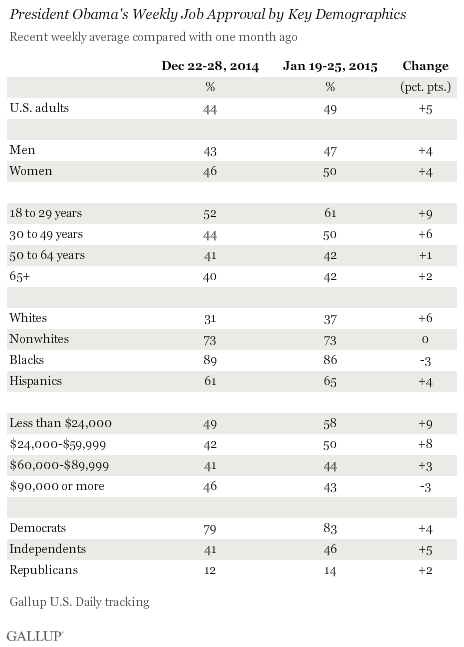By Glynn Wilson –
Less than a week after President Barack Obama delivered his State of the Union address to a new Republican-dominated Congress, his job approval rating reached 50 percent in Gallup’s daily tracking poll, the first time since June 2013.
Three months ago, in mid-October, only 39 percent of Americans approved of Obama’s job performance — near his term low of 38 percent. His approval recovered to 42 percent by the time of the Nov. 4 midterm elections.
After announcing executive actions on immigration and benefiting from an improving economy and falling gas prices, according to Gallup, his approval rating has gradually improved, averaging 44 percent in December and 46 percent in January.
Even if the president’s job approval rating doesn’t hold at the 50 percent level, it has consistently registered in the mid- to high 40s throughout January, earning him the highest weekly averages he has seen in more than a year, Gallup says. His weekly average for the seven days ending Jan. 25 was 49 percent.
Notably, the recent uptick in Obama’s weekly job rating follows a period of significant improvement in Americans’ confidence in the U.S. economy. Economic confidence started improving in September. It then intensified in late December when Gallup’s Economic Confidence Index crossed into positive territory for the first time in more than seven years, and it has since remained positive. Americans’ ratings of Obama appear to be catching up with their improved economic views.
“It is not entirely clear why Obama’s job approval rating has been slow to rebound relative to improved economic confidence, but one reason could be the political blow Obama took in November over his party’s sweeping midterm election losses,” Gallup says in its analysis. “Another could be the racial tensions that engulfed the country late last year over certain police interactions with young black males. This was evident in a sharp spike in Americans mentioning race relations as the nation’s top problem in December.”
The president’s Jan. 20 State of the Union address may have helped him reframe the national discussion on terms more favorable to him, Gallup says, getting the country to focus on the economy.
“Although presidents rarely get much of a bounce from their State of the Union speeches, this year’s address afforded Obama the opportunity to tout good economic news that some Americans may not have already known about, or at least allowed him to convince viewers that he deserved more of the credit,” Gallup says.
It is difficult to determine which groups are most responsible for Obama’s immediate post-speech approval gains, as many of the changes are within the margin of error, according to Gallup.
“However, compared with late December, it is clear that Obama’s approval rating is up more among whites than among nonwhites, as well as up more sharply among younger adults — those aged 18 to 49 — than among older adults. Also, his rating is significantly improved among lower-income and lower-middle-income Americans, whereas it is flat or down among higher-income Americans.”
Gallup’s Bottom Line
With Gallup’s Economic Confidence Index consistently positive in January, past Gallup research suggests Obama ought to be enjoying job approval scores of 50 percent or better, and now he is.
“Given the increase in Obama’s approval rating after the State of the Union address to Congress, it appears that speech may have helped him over the hump,” Gallup says. “These speeches aren’t always effective at moving the public-opinion needle, but — similar to the experience Bill Clinton had in 1998 — on occasion, when the president has credibly positive economic news to report, the attention it brings can be useful.”
Survey Methods
Results for this Gallup poll are based on telephone interviews conducted Jan. 23-25, 2015, on the Gallup U.S. Daily survey, with a random sample of 1,527 adults, aged 18 and older, living in all 50 U.S. states and the District of Columbia. For results based on the total sample of national adults, the margin of sampling error is plus or minus 3 percentage points at the 95 percent confidence level.

















